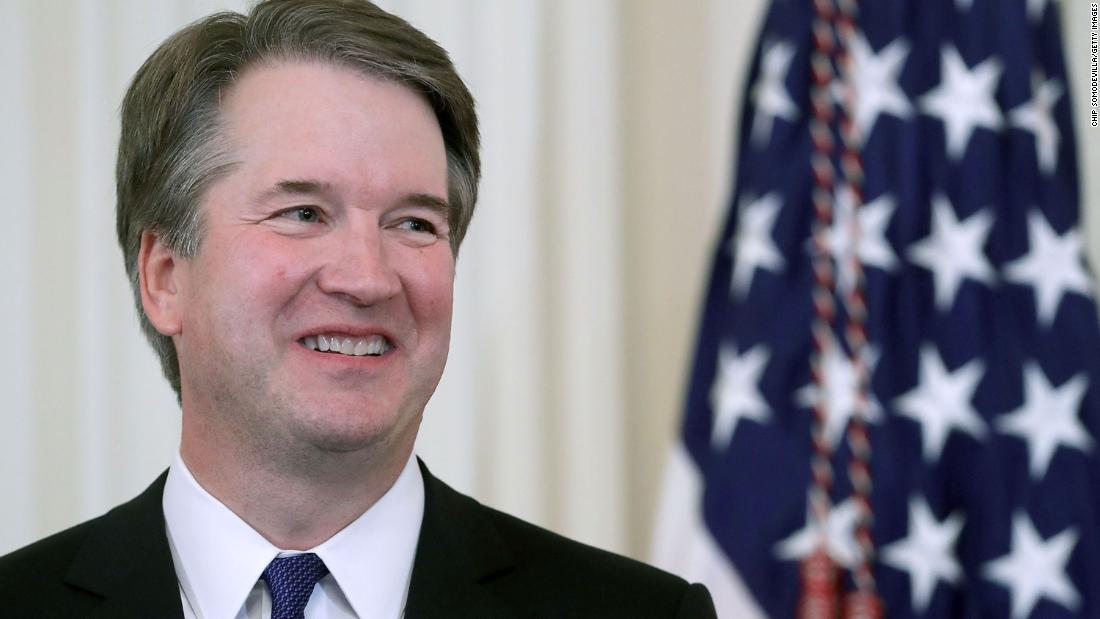
In a 10-page order, the council said that the complaints -- the first of which were referred to the court by Chief Justice John Roberts on October 10 -- could not be acted on because Kavanaugh, as a justice, is no longer covered by the judiciary's misconduct rules.
The complaints alleged that Kavanaugh violated various provisions of the Code of Conduct for federal judges, including those dictating that judges should maintain and enforce high standards of conduct, avoid impropriety and refrain from political activity or activities that would adversely affect impartiality. Some of the complaints directly deal with Kavanaugh's response to sexual assault allegations from Christine Blasey Ford, which resulted in a fiery response during a contentious and emotional confirmation hearing.
"Complainants' allegations vary ... but they generally allege the Justice Kavanaugh made false statements during his nominations proceedings to the DC Circuit in 2004 and 2006 and to the Supreme Court in 2018; made inappropriate partisan statements that demonstrate bias and a lack of judicial temperament; and treated members of the Senate Judiciary Committee with disrespect," wrote 10th Circuit Chief Judge Timothy Tymkovich.
In dismissing the complaints, the council said, "the Act covers individuals only while they are circuit, district, bankruptcy or magistrate judges, even if the alleged misconduct occurred during the time the judge was covered by the Act."
The council was referring to the 1980 Judicial Conduct and Disability Act. Supreme Court justices have long been exempted from the judiciary's disciplinary rules under that law.
Legal experts have said that Congress chose not to include Supreme Court justices in the law because of their position at the helm of the third branch of government under the Constitution. Lawmakers at time worried it might have appeared unseemly for the justices to fall under the authority of any lower court disciplinary panel, experts say.
The order filed Tuesday argued the judicial council did not have the authority to do more than dismiss the complaints.
"The allegations contained in the complaints are serious, but the Judicial Council is obligated to adhere to the Act. Lacking statutory authority to do anything more, the complaints must be dismissed because an intervening event -- Justice Kavanaugh's confirmation to the Supreme Court -- has made the complaints no longer appropriate for consideration under the Act," the order stated.
Kavanaugh, who had served for 12 years on a lower federal court, won the life-tenured seat in October after a bitter partisan fight. Senate Democrats criticized his conservative positions on the law during the first round of hearings, but the more volatile session came when Ford accused the nominee of sexually assaulting him when both were teenagers in suburban Maryland.
In an emotional response, Kavanaugh denied the claims and attacked Democratic senators as they questioned him. The Senate approved him by a 50-48 vote on October 6. Only one Democrat, Sen. Joe Manchin of West Virginia, voted for the appointee of President Donald Trump.
It was Kavanaugh's emotional response that formed the basis of some of the complaints. The allegations stretch from his time as a nominee for the DC Circuit to his explosive testimony on September 27 after Ford made her allegations public.
According to the order, "the complaints generally allege that Justice Kavanaugh in his appearances before the Senate Judiciary Committee ... falsely testified about his involvement in various events or programs while he was Assistant White House Counsel and Secretary to the President during the George W. Bush administration; ... falsely testified about his personal conduct, behavior, and recollection of events prior to his joining the federal judiciary; and ... displayed partisan bias and a lack of appropriate judicial temperament."
Some complaints specifically alleged that Kavanaugh lied about the George W. Bush administration's anti-terrorism policies. Others referred to the vow of "vengeance" when he declared, after saying he was subject to a partisan attack, "what goes around comes around." He was also accused of misrepresenting his history of alcohol consumption.
One allegation deemed his Sept. 27 testimony "evasive, aggressive and condescending. When questioned by female Senators he acted like a bully, often interrupting and improperly posing questions to his interrogator."
The initial 15 complaints referred to the 10th Circuit by Roberts arose from statements Kavanaugh made during his first round of hearings before the Senate Judiciary Committee in September.
When Roberts transferred the series of complaints filed at the DC Circuit, he noted the complaints were moved because federal rules state that local handling of such complaints could undermine public confidence in the system.
The judicial council said it made copies of the complaints available on the 10th Circuit website but blacked out names of those who filed the complaints and identifying information.
This story has been updated.
Bagikan Berita Ini















0 Response to "Complaints against Brett Kavanaugh dismissed by federal judiciary council"
Post a Comment